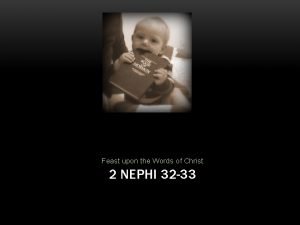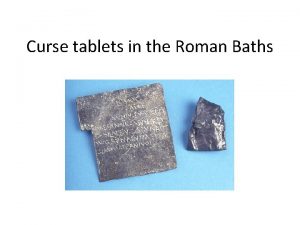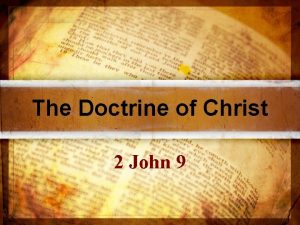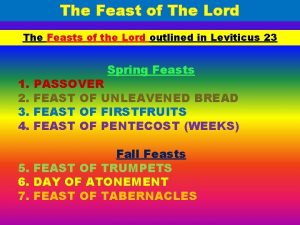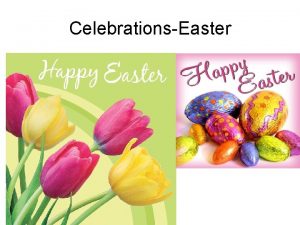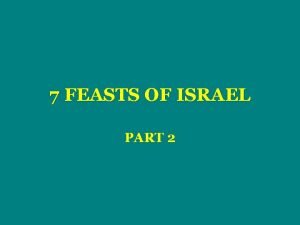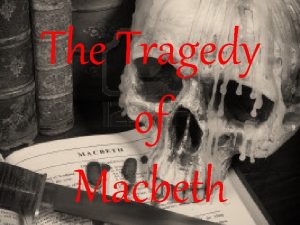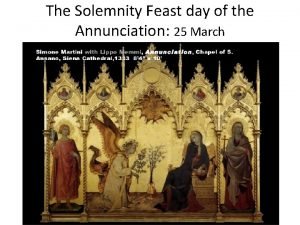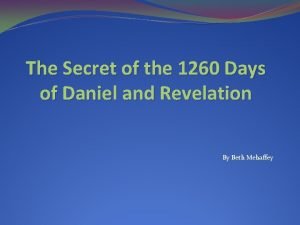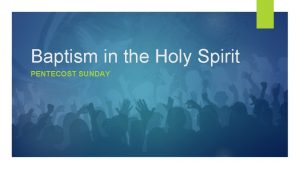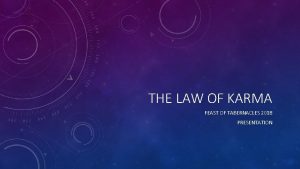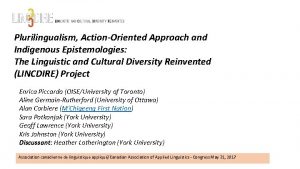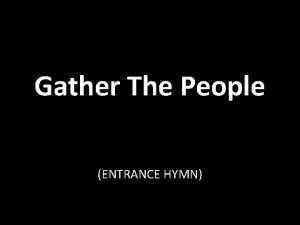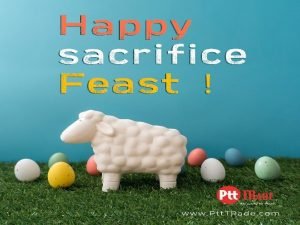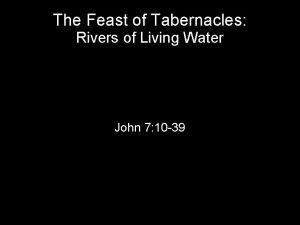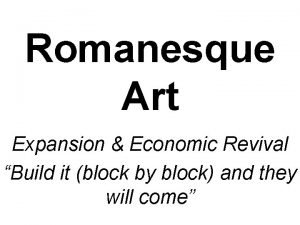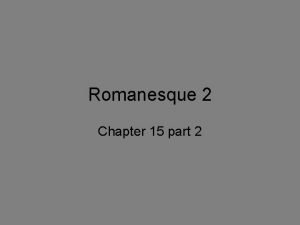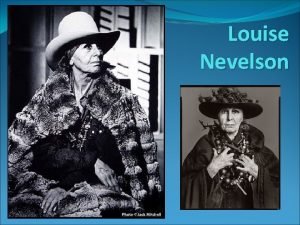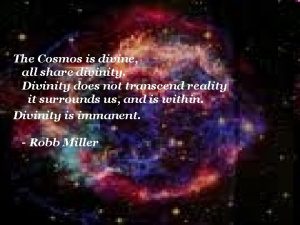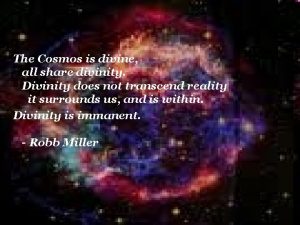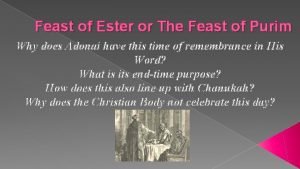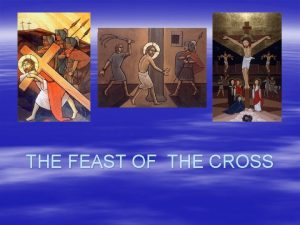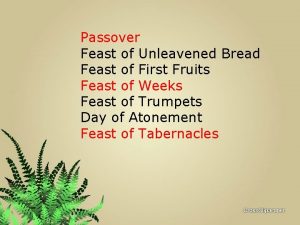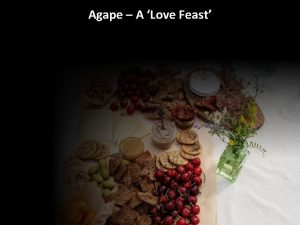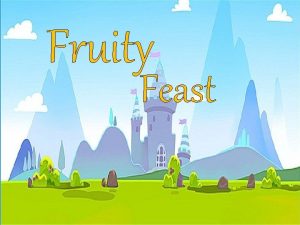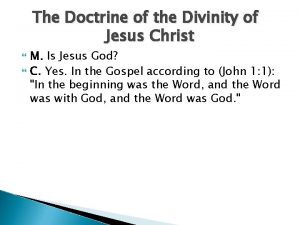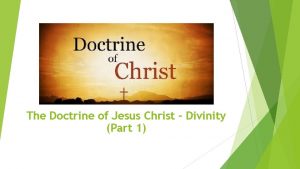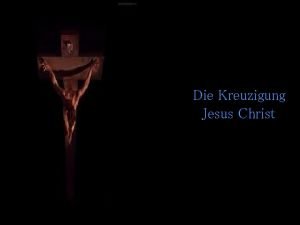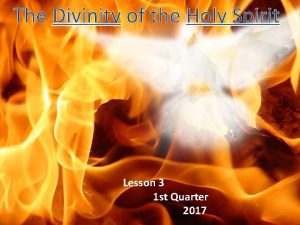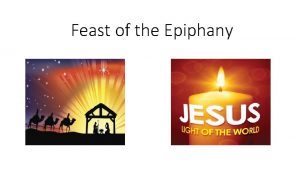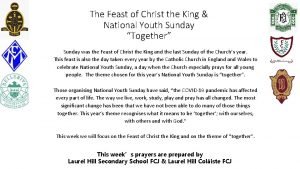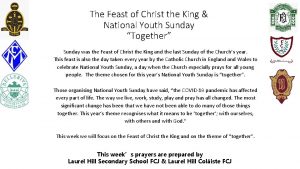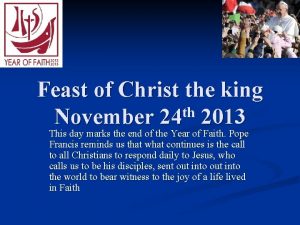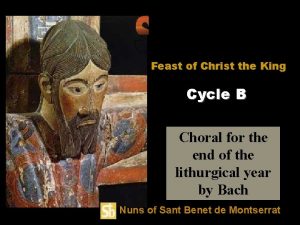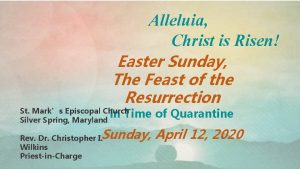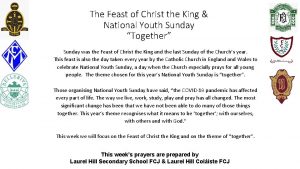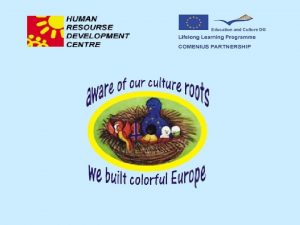Lesson 66 Divinity of Christ John 7 Feast





























- Slides: 29

Lesson 66 Divinity of Christ John 7 Feast of the Tabernacles

The Law Three times a year all the males of the covenant people were to appear before the Lord in the place that he should choose: The Feast of Unleavened Bread—Passover The Feast of Harvest--The Feast of Weeks or Pentecost The Feast of Ingathering--The Feast of Tabernacles (Ex 23: 14 -17; Deut. 16: 16) (1)

John 7 -8 takes place in the autumn of the third year of the Lord’s ministry. In New Testament times, the Feast of Tabernacles was considered “the greatest and most joyful” of the feasts. Celebrated in the modern months of September and October. The ceremonial 7 day feast was of thanksgiving and praise, followed by a holy convocation on the 8 th day. (1, 2)

Jesus was planning to attend the Feast of the Tabernacles in Jerusalem. James Tissot John 7: 2

Some of His brethren (kinsmen) felt the feast would be a good opportunity for Jesus to make a public declaration of His divine mission. John 7: 4

What was the Feast of Tabernacles about? A remembrance of Exodus out of Egypt, and the time spent in the wilderness. And the “gathering-in” of all the fruits of the year. Lev. 23: 43; Ex. 23: 16

During the feast they live in tents “sekhakh” Leviticus 23: 42 Building small booths…walls of plaited branches and thatched roofs made from all earth materials. (2)

“lulaw” made of the branches of palm trees, myrtles and willows tied together with a golden thread. Modern day “sekhakh” Or “Sukkot” During the celebration in the Temple these lulaw would be waved at certain times during the service. (2)

During the 40 years in the wilderness they built a Tabernacle… and worshipped there

Zechariah in prophetic imagery represents the nations as coming up to Jerusalem to keep the Feast of Tabernacles and described the curse that should fall on those who did not come. Zechariah 14: 16 -19 No rain and plagues

Jewish leaders, not the Jewish public in general. Jesus had been staying in the Galilee area, where he had experienced great popularity, and avoiding the regions surrounding Jerusalem because they were heavily influenced by Jewish leaders who sought to kill Him. e lile a G Jerusalem John 7: 1

Did Jesus Have Brothers and Sisters? Matthew 12: 46 While he yet talked to the people, behold, his mother and his brethren stood without, desiring to speak with him. Matthew 13: 55 Is not this the carpenter’s son? is not his mother called Mary? and his brethren, James, and Joses, and Simon, and Judas? John 2: 12 After this he went down to Capernaum, he, and his mother, and his brethren, and his disciples: and they continued there not many days. Acts 1: 14 These all continued with one accord in prayer and supplication, with the women, and Mary the mother of Jesus, and with his brethren. 1 Corinthians 9: 5 Have we not power to lead about a sister, a wife, as well as other apostles, and as the brethren of the Lord, and Cephas?

“My time is not yet come” Jesus rejected the suggestion and delayed His departure for a few days, but he told the brethren to go. Jesus’s half-brothers urged Him to go to Jerusalem to the Feast of Tabernacles. Jesus told them no, but He later went to the feast secretly and began to teach in the temple John 7: 1 -4 (1)

“A testimony of the divinity of Christ and of the saving power of his gospel is not bestowed automatically because of family relationship. “… Though they were reared in the same household and came under the benign influence of Joseph and Mary, though they were aware of the teachings, ministry, and miracles of Jesus himself, yet these his close relatives had not so far accepted him as the Messiah. John 7: 5; Acts 1: 14 However, all of them, apparently, were converted later. ” (3)

Teaching at the Temple During the 3 rd or 4 th day Jesus went to Jerusalem He honors His Teacher, His Eternal Father and not Himself He tells them that they do not keep the Law of Moses He asks why they want to kill him when he has done some marvelous works among them He asks them to not be judgmental John 7: 16, 19, 21, 24

If we do Heavenly Father’s will, then we will receive a testimony of His doctrine “We acquire a testimony of the principles of the gospel by obediently trying to live them. … A testimony of the efficacy of prayer comes through humble and sincere prayer. A testimony of tithing comes by paying tithing. ” (4)

Doctrinal Mastery John 7: 17 If any man will do his will, he shall know of the doctrine, whether it be of God, or whether I speak of myself.

Unbelief Many Jews refused to listen to At times, we may need to abandon certain traditions in order to keep the laws of God. Jesus because they believed He was not obeying the Mosaic law, which over the centuries “Judge not had become corrupted. according to your They were angry with Him because He had healed a man on the Sabbath day, which was not allowed by the Mosaic law of that time. traditions, but judge righteous judgment” Some people heard the Savior’s teachings and believed that He was the Messiah. The Pharisees, knowing that Jesus was helping the Jews to see the truth, sent officers to arrest Him. John 7: 21 -23; 30 -34 Jesus told them that soon they would seek Him but not find Him, for “where I am, thither ye cannot come” (1)

“Then cried Jesus in the temple as he taught, saying, Ye both know me, and ye know whence I am: and I am not come of myself, but He that sent me is true, who ye know not. ” John 7: 28

Illumination On the temple mount, four large golden candelabras (also called menorahs or candlesticks) illuminated the temple grounds during dances and other festivities held late into the night and early morning. The golden candelabras, which were 50 cubits tall (approximately 73 feet or 22. 25 meters), not only provided light for the celebrations, but they symbolized that Israel was to be a light to those who walked in darkness. The most renowned anticipated ceremony of the feast was the daily procession, during which an appointed priest drew water from the pool of Siloam with a golden pitcher and poured the water into the silver basin at the base of the temple altar, along with the morning wine offering. John 7: 21 -23; 30 -34 (1)

Water and Light Water and light were used as important symbols during the Feast of Tabernacles, and the Savior used these symbols to call the people to believe in Him as the Messiah. But this spake he of the Spirit, which they that believe on him should receive: for the Holy Ghost was not yet given; because that Jesus was not yet glorified. During each of the eight days of the Feast of Tabernacles an appointed priest drew water from the pool of Siloam with a golden pitcher and poured the water into the silver basin at the base of the temple altar. On the last day of the Feast of Tabernacles, when the priest had done so, Jesus stood and offered an invitation to the people. John 7: 37 -39 (1, 3)

The Living Water = The Holy Ghost The Savior’s imagery of ‘living water’ drew upon a long Israelite tradition that water represented important spiritual truths. In the arid climate of the ancient Near East, access to water was crucial for survival, and the scarcity of water made it both a valuable resource and a powerful symbol. The Lord saved Israel in Horeb when Moses miraculously brought forth water out of a rock The Old Testament prophets Isaiah, Jeremiah, and Ezekiel used water as a symbol of the Lord’s Spirit, provident care, and healing power. Exodus 17; Numbers 20; Isaiah 41: 17– 18; 58: 11; Jeremiah 2: 13; Ezekiel 47: 1– 12 (1)

Within the Believer The Savior taught that when someone believes in Him, “out of his belly shall flow rivers of living water. ” This phrase suggests that the “living water” will be within the believer. It will not be poured out by a priest on the altar as was done at the Feast of Tabernacles; it will arise and flow miraculously from within the believer. The Savior’s promise that those who believed in Him would at some future time have “living water” within them reflected the fact that “the Holy Ghost was not yet given” John 7: 38 -39 (1)

Nicodemus Defends The Savior The chief priests and Pharisees again desired to have Jesus arrested. Nicodemus, the Pharisee who had come to the Savior by night, came to the Savior’s defense and reminded his fellow Pharisees and the chief priests that their own law would not allow an individual to be condemned until he was given a chance to be heard. James Tissot John 7: 50 -53; John 3: 1 -2 (1)

Sources: Suggested Hymn: #89 The Lord is My Light 1. 2. 3. 4. New Testament Institute Student Manual Chapter 23 Bible Dictionary Elder Bruce R. Mc. Conkie (Doctrinal New Testament Commentary, 3 vols. [1965– 73], 1: 437). President James E. Faust (“Lord, I Believe; Help Thou Mine Unbelief, ” Ensign or Liahona, Nov. 2003, 22). Presentation by ©http: //fashionsbylynda. com/blog/

Event Matthew Mark Luke John Jews Seek to Kill Jesus 7: 1 Jesus is Urged to Attend the Feast of the Tabernacles 7: 2 -9 Jesus Goes to the Feast in Secret 9: 51 -56 7: 10 Crowds at Feast Discussing Jesus 7: 11 -13 Jesus Teaches at the Temple 7: 14 -36 Crowds Debate Jesus The Brethren of Christ: John 7: 4 “Frequent special reference is made to the sons of Joseph and Mary as the ‘brethren’ of Jesus, though in fact they were his half-brothers. (Matt. 12: 46; 13: 55; John 2: 12; Acts 1: 14; 1 Cor. 95. ) Though they were reared in the same household and came under the benign influence of Joseph and Mary, though they were aware of the teachings, ministry, and miracles of Jesus himself, yet these his close relatives had not so far accepted him as the Messiah. However, all of them, apparently, were converted later (Acts 1: 14); one of them, identified by Paul as ‘James the Lord’s brother’ (Gal. 1: 19), was to minister in the holy apostleship; and yet another, Judas, who calls himself, ‘Jude, the … brother of James’ (Jude 1), wrote the epistle of Jude” Bruce R. Mc. Conkie (Doctrinal New Testament Commentary, 3 vols. [1965– 73], 1: 437). Half-brothers: Though early on, these half-brothers of the Lord didn't believe, later on some of them would become great leaders in the Church. In particular, James was an apostle who took an important role in the leadership of the early Church. He may have replaced James, the brother of John, after his martyrdom (Acts 12: 1 -2). James conducted a meeting in which the policy of the Church regarding the law of Moses was determined (Acts 15). He was later known as the Bishop of Jerusalem and has been referred to as "James the Just. " Judas, or Jude, was another brother of the Lord. He was probably the author of the book of Jude (See Bible Dictionary). 7: 37 -53 Brethren Doubts John 7: 4: "Even a quick reading of the Gospels and Acts shows that the New Testament writers did not intend to give a comprehensive picture of the personal life or family of Jesus. . . Still, one naturally wonders about Jesus' family, who they were and what they did. "We do know that Jesus had four brothers and more than one sister. The people of Nazareth objected to the divine calling of Jesus on the grounds that he was someone who had grown up in their midst. 'Is not this the carpenter's son? ' they asked in astonishment. 'Is not his mother called Mary? and his brethren, James, and Joses, and Simon, and Judas? And his sisters, are they not all with us? ' (Matt. 13: 55 -56. ). . . John relates an interesting event concerning the brethren of Jesus telling us that they did not fully accept him as the Messiah while he was laboring among them: 'Now the Jews' feast of tabernacles was at hand. His brethren therefore said unto him [their brother, Jesus], Depart hence, and go into Judaea, that thy disciples also may see the works that thou doest. For there is no man that doeth any thing in secret, and he himself seeketh to be known openly. If thou do these things, shew thyself to the world. For neither did his brethren believe in him. ' (John 7: 2 -5. ) "The brothers knew something of Jesus' work and miracles and of his following, but they were doubtful themselves, or at least wished him to be more open about his mission. They did not believe in him, which may refer to the claims he made about being the Messiah and the Son of God. In fact, when the people of Nazareth rejected the Savior, he exclaimed, 'A prophet is not without honour, but in his own country, and among his own kin, and in his own house. ' (Mark 6: 4. ) But evidently the brothers were converted shortly thereafter, for Luke records that immediately after Christ's ascension into heaven, the church met in 'prayer and supplication, with the women, and Mary the mother of Jesus, and with his brethren. ' (Acts 1: 14. ) Also, Paul includes James in his list of those who had seen the resurrected Lord. (See 1 Cor. 15: 7. )" Gerald N. Lund (Jesus Christ, Key to the Plan of Salvation [Salt Lake City: Deseret Book Co. , 1991], 47. )

If Any Man Will Do His Will John 7: 17: “Sometimes we try to do it backward. For example, we may take this approach: I will be happy to live the law of tithing, but first I need to know that it’s true. Maybe we even pray to gain a testimony of the law of tithing and hope the Lord will bless us with that testimony before we have ever filled out a tithing slip. It just doesn’t work that way. The Lord expects us to exercise faith. We have to consistently pay a full and honest tithe in order to gain a testimony of tithing. This same pattern applies to all the principles of the gospel, whether it is the law of chastity, the principle of modesty, the Word of Wisdom, or the law of the fast” Sister Bonnie L. Oscarson (“Be Ye Converted, ” Ensign or Liahona, Nov. 2013, 77). The Living Water John 7: 39: “The Savior’s promise that those who believed in Him would at some future time have ‘living water’ within them reflected the fact that ‘the Holy Ghost was not yet given’ (John 7: 39). ‘For some reason not fully explained in the scriptures, the Holy Ghost did not operate in the fulness among the Jews during the years of Jesus’ mortal sojourn (John 7: 39; 16: 7). Statements to the effect that the Holy Ghost did not come until after Jesus was resurrected must of necessity refer to that particular dispensation only, for it is abundantly clear that the Holy Ghost was operative in earlier dispensations. Furthermore, it has reference only to the gift of the Holy Ghost not being present, since the power of the Holy Ghost was operative during the ministries of John the Baptist and Jesus; otherwise no one would have received a testimony of the truths that these men taught (Matt. 16: 16– 17; see also 1 Cor. 12: 3)’ (Bible Dictionary, ‘Holy Ghost’)” (New Testament Student Manual [Church Educational System manual, 2014], 224). The Gift of the Holy Ghost: John 7: 39 “For some reason not fully explained in the scriptures, the Holy Ghost did not operate in the fulness among the Jews during the years of Jesus’ mortal sojourn (John 7: 39; 16: 7). Statements to the effect that the Holy Ghost did not come until after Jesus was resurrected must of necessity refer to that particular dispensation only, for it is abundantly clear that the Holy Ghost was operative in earlier dispensations. Furthermore, it has reference only to the gift of the Holy Ghost not being present, since the power of the Holy Ghost was operative during the ministries of John the Baptist and Jesus; otherwise no one would have received a testimony of the truths that these men taught (Matt. 16: 16– 17; see also 1 Cor. 12: 3)” (Bible Dictionary, “Holy Ghost”). Shall Christ Come out of Galilee? John 7: 41: Christ had just taught the people that they should 'judge righteous judgment' (v. 24). Yet, their personal prejudice and self-righteousness are evident in the way they condescendingly speak of Galileans. They were judging according to their traditions (see JST Jn. 7: 24), not according to righteousness. The Master would not correct them by declaring his rightful birth in Bethlehem because 'He that speaketh of himself seeketh his own glory' (v. 18). Gospeldoctrine. com "Jerusalem was the place where the sects (Pharisees and Sadducees) flourished, with few of their followers dwelling outside its vicinity. The masses that made up the towns and villages of the land were known as the Am ha Aretz or the 'people of the land. ' Uninstructed in the detail of the traditions, they were looked upon as ignorant, common, country folk. The people of the region of Galilee and the countryside of Judea fell short in the eyes of the sects in fulfilling the requirements of the law of God. The scriptural record demonstrates the skeptical view held of the country folk by the religionists, 'Can there any good thing come out of Nazareth? . . . ' (John 1: 46. ) 'Art thou also of Galilee? Search, and look: for out of Galilee ariseth no prophet. ' (John 7: 52. ) Yet it was from among the people of the land that Jesus called those who were to be apostles. " (Edward J. Brandt, "Everyday Life in Palestine, " Ensign, Sept. 1974, 22) Nicodemus John: 7: 51 -52: "Nicodemus also eventually overcame his trepidation and his fear of not appearing to be respectable. He defended the Savior before the chief priests and Pharisees, saying: 'Doth our law judge any man, before it hear him, and know what he doeth? ' This was a very daring course of action on the part of Nicodemus, for it caused his colleagues to ask, 'Art thou also of Galilee? ' (John 7: 51 -52. ) The courage of Nicodemus in the face of opposition was confirmed at the crucifixion site when he 'brought a mixture of myrrh and aloes' to assist in the preparation of the crucified body of Jesus (John 19: 39). " Spencer J. Condie (Your Agency, Handle with Care [Salt Lake City: Bookcraft, 1996], 47. )

John 7: 19 None of you keepeth the law? Ten Commandments Actions of the Jews 1. Thou shalt have no other gods before me The Jews placed their tradition before God, and rejected the Holy One of Israel 2. No graven image Though they made no graven images, they were guilty of a more heinous form of idolatry. 3. Do not take the name of the Lord thy God in vain They did worse than take the name of the Lord in vain-they took the life of the Lord Jesus in vain 4. Remember the Sabbath day They had lost the Spirit of the Sabbath by distorting Sabbath worship into a profuse list of restrictive rules 5. Honor thy Father and thy Mother They would release themselves from this duty by the law of corban (Matthew 14: 4 -6) 6. Thou shalt not kill They would plot and consent to the murder of Christ 7. Thou shalt not commit adultery They were a wicked and adulterous generation (Matthew 16: 1 -4) 8. Thou shalt not steal They would devour widow's houses (Matthew 23: 14) and were full of extortion and excess (Matthew 23: 25) 9. Thou shalt not bear false witness Many would bare false witness against Christ (Mark 14: 56, see also John. 8: 55) 10. Thou shalt not covet They coveted Christ's knowledge, authority, and popularity (Mark 15: 10)

Excerpts from "Our Relationship with the Lord" by Bruce R. Mc. Conkie We worship the Father and him only and no one else. We do not worship the Son, and we do not worship the Holy Ghost. I know perfectly well what the scriptures say about worshipping Christ and Jehovah, but they are speaking in an entirely different sense—the sense of standing in awe and being reverentially grateful to him who has redeemed us. Worship in the true and saving sense is reserved for God the first, the Creator. Our relationship with the Father is supreme, paramount, and preeminent over all others. He is the God we worship. It is his gospel that saves and exalts. He ordained and established the plan of salvation. He is the one who was once as we are now. The life he lives is eternal life, and if we are to gain this greatest of all the gifts of God, it will be because we become like him. Our relationship with the Father is one of parent and child. He is the one who gave us our agency. It was his plan that provided for a fall and an atonement. And it is to him that we must be reconciled if we are to gain salvation. He is the one to whom we have direct access by prayer, and if there were some need—which there is not!— to single out one member of the Godhead for a special relationship, the Father, not the Son, would be the one to choose. Our relationship with the Son is one of brother or sister in the premortal life and one of being led to the Father by him while in this mortal sphere. He is the Lord Jehovah who championed our cause before the foundations of the earth were laid. He is the God of Israel, the promised Messiah, and the Redeemer of the world. By faith we are adopted into his family and become his children. We take upon ourselves his name, keep his commandments, and rejoice in the cleansing power of his blood. Salvation comes by him. From Creation’s dawn, as long as eternity endures, there neither has been nor will be another act of such transcendent power and import as his atoning sacrifice. We do not have a fraction of the power we need to properly praise his holy name and ascribe unto him the honor and power and might and glory and dominion that is his. He is our Lord, our God, and our King. There are yet others who have an excessive zeal which causes them to go beyond the mark. Their desire for excellence is inordinate. In an effort to be truer than true they devote themselves to gaining a special, personal relationship with Christ that is both improper and perilous. I say perilous because this course, particularly in the lives of some who are spiritually immature, is a gospel hobby which creates an unwholesome holier-than-thou attitude. In other instances it leads to despondency because the seeker after perfection knows he is not living the way he supposes he should. Another peril is that those so involved often begin to pray directly to Christ because of some special friendship they feel has been developed. It is true that there may, with propriety, be a special relationship with a wife, with children, with friends, with teachers, with the beasts of the field and the fowls of the sky and the lilies of the valley. But the very moment anyone singles out one member of the Godhead as the almost sole recipient of his devotion, to the exclusion of the others, that is the moment when spiritual instability begins to replace sense and reason. It is a fine and sacred line, but clearly there is a difference between a personal and intimate relationship with the Lord, which is improper, and one of worshipful adoration, which yet maintains the required reserve between us and him who has bought us with his blood. Brigham Young University on 2 March 1982.
 2 nephi 32 3 meaning
2 nephi 32 3 meaning You invest in the divinity of the masterpiece meaning
You invest in the divinity of the masterpiece meaning Barbara kruger
Barbara kruger Divinity stolen items
Divinity stolen items What is the doctrine of christ in 2 john
What is the doctrine of christ in 2 john Tinikling formation
Tinikling formation The feast of the lord
The feast of the lord Feast of firstfruits in the bible
Feast of firstfruits in the bible Romeo and juliet trivia
Romeo and juliet trivia Feast food meaning
Feast food meaning Feast of first fruit
Feast of first fruit Why is easter a moveable feast
Why is easter a moveable feast 7 feasts of the lord
7 feasts of the lord Blood hath been shed ere now
Blood hath been shed ere now The annunciation feast day
The annunciation feast day Book of daniel 1260 days
Book of daniel 1260 days 1. from where does kat recognize the girl with red hair?
1. from where does kat recognize the girl with red hair? Pentecost kjv
Pentecost kjv Feast of tabernacles 2018
Feast of tabernacles 2018 Feast during holidays
Feast during holidays Feast of st patrick
Feast of st patrick Lite lincdire project
Lite lincdire project Gather the people
Gather the people Why feast during
Why feast during Sacrifice feast
Sacrifice feast Living water feast worship
Living water feast worship Bishop odo blessing the feast
Bishop odo blessing the feast The oldest known bronze tomb effigy is of
The oldest known bronze tomb effigy is of Dawn's wedding chapel iv
Dawn's wedding chapel iv Lesson outline lesson 3 describing circuits answers
Lesson outline lesson 3 describing circuits answers
